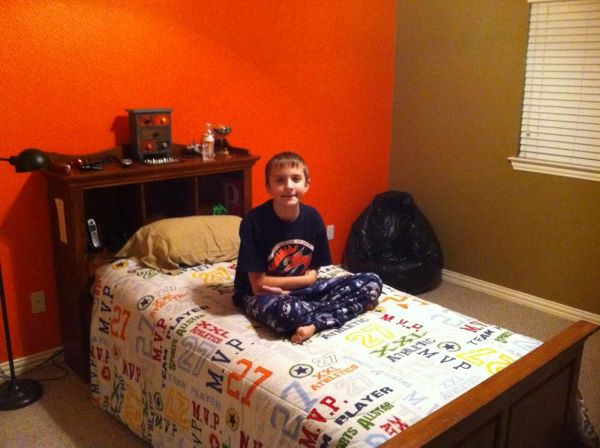Autism and Organization: The Secret to Finding Calm in the Chaos
Nobody likes clutter. Being organized helps with the ability to keep areas clean and to find things when you need them. But autism and organization, or lack of, is a common trait that adds to an already chaotic world for individuals on the spectrum. That’s why incorporating strategies for autism and executive functioning are so important.
The stereotype with autism is that individuals with the spectrum disorder are organized to the point of obsession. People imagine living and work spaces hyper-organized and clean, with everything neatly in its place. But that’s where the fallacy begins.
 While it may be true for some, it’s important to understand that autism and organization only applies to what the individual believes constitutes clean. Clutter and autism can actually be excessive, because in the mind of someone with autism, it is organized appropriately.
While it may be true for some, it’s important to understand that autism and organization only applies to what the individual believes constitutes clean. Clutter and autism can actually be excessive, because in the mind of someone with autism, it is organized appropriately.
That means it could include stacks of papers or a space where clothes are put in the corner of a room on the floor rather than tucked away in conventional spaces like dressers or in the closet.
Those chosen spots can be in public spaces and interfere with boundaries or others’ perceptions of being clutter-free.
You can probably see where this is going, and where the potential conflict can come in with family members and friends.
Autism and executive function challenges are real. When the lack of organization involves a child, a well-meaning parent or loved one may put things away in a way that are more traditionally acceptable. But, touching a person’s things and moving items can create anxiety and stress, or worse, meltdowns and even aggression, rather than fixing the problem.
Autism and organization may become more apparent if the autistic is living independently. There may be numerous unspoken “rules” about where things go, and they may be stressors for roommates or partners.
The sensory sensitivities and executive functioning challenges associated with autism spectrum disorder can make it intensely difficult to keep spaces clean and clutter-free. At the same time, living in a chaotic, messy environment can dramatically increase stress levels and make it harder to focus or concentrate on tasks.
With some understanding of why clutter accumulates and the right personalized strategies, it is possible for those with autism to create and maintain a more organized, peaceful home environment.
By acknowledging autism and executive function and what compromises are possible, a balance between organization and the level of clutter can be manageable for everyone.
RELATED: 5 Ingenious Ways for Creating Boundaries in a Relationship
Autism and Organization: How It Impacts Clutter Struggles
There are a number of reasons why clutter frequently builds up and things fall out of place for individuals on the spectrum. Five key factors behind these common autism and executive function struggles include:
1. Difficulties with Autism and Executive Functioning
A core challenge for many living with autism are deficits in executive functioning – the set of mental processes that enable planning, organization, flexible thinking, inhibition, regulating emotions, starting tasks, time management, and multi-tasking.
These executive functioning difficulties make it exceedingly hard to organize possessions, remember to put items back in their designated places, sort through what does or doesn’t need keeping, create cleaning schedules, and follow through consistently on necessary tidying or decluttering tasks.
Big picture organizational jobs like tackling an entire messy closet or basement seem cognitively overwhelming due to the planning and decision making involved, leading to avoidance which allows clutter to worsen.
Things commonly build up to near hoarding levels for those profoundly challenged in these areas of functioning.
RELATED: Top 10 Autism Challenges Explored
2. Sensory Sensitivities and Executive Function Challenges
While messiness doesn’t apply to everyone the spectrum due to accompanying hyposensitivities (under-responsiveness to stimuli), those with tactile sensitivities may find certain textures, food crumbs or sticky spots extremely disturbing. Those same sensitivities may result in becoming a picky eater.
Individuals with auditory sensitivities struggle with noisy and/or crowded environments so the visual clutter adding to overwhelming sensory input can exacerbate tension. Those on the spectrum prone to anxiety are deeply distressed by disorder surrounding them even if their executive functioning deficit means they struggle to fix it without support.
An unorganized home environment heightens arousal. People vary significantly so while those with hyposensitivities track into the clutter and autism range, while others verge toward minimalism seeking an external order they lack internally.
RELATED: 10 Proven Techniques for Managing Autism and Sensory Issues
3. Special Interests Leading to Collections
One of the hallmark characteristics of autism spectrum disorder are intense special interests. For many this involves amassing sizable collections related to their specific passion, whether it is model trains, fossils, anime films, dinosaur figurines, or porcelain dolls.
Over years these collecting habits spawned by special interests can take over rooms or even whole houses without organizational systems and consistent removal of no longer meaningful items. Without structure, the continuous acquiring centered around passions crowds out space for day to day living.
RELATED: OCD and Autism Link – Are You Organized or Obsessed
4. Life Transitions Causing Upheaval and Lack of Organization
Any major life change poses challenges to those on the spectrum, who often rely on sameness and routine to maintain equilibrium.
Whether it’s the disruption of moving, adding members to a household, changing schools or beginning college, transitions scatter routine and demand handling paperwork, parting with belongings and establishing new systems.
All this simultaneous upheaval taxes already limited coping skills and executive functioning bandwidth. The stress during changes means organizational tasks slide as individuals focus their mental energy on managing panic and uncertainty.
RELATED: The Fascinating Explanation of Spoon Theory Mental Health
5. Depression and Anxiety Can Contribute to Executive Function Challenges
Many people with autism have co-occurring mental health issues like clinical anxiety or depression along with symptoms of autism spectrum disorder (ASD), further compounding organizational problems.
During depressive episodes, low motivation and energy prevent establishing the habits required for tidying and decluttering. As anxiety rises, clarity plummets which impedes sorting or logical decision making about possessions.
Prioritizing self-care over cleaning is important, although professional supports can ease this burden.
In kids, these executive functioning and information processing challenges combine with parental fatigue struggling with their own demanding schedules and coping capacity. The same holds true with adults with relationships, such as roommates or partners.
Without judgment, professional supports that help transition with changes and building ongoing systems can relieve negative cycles.
RELATED: New Research Reveals Autism Mental Health Linked to These Disorders
6 Tips for Coping with Clutter and Autism
 If you or someone you love with autism struggles with mess and lack of organization, implementing structure through tailored systems can be a working solution.
If you or someone you love with autism struggles with mess and lack of organization, implementing structure through tailored systems can be a working solution.
Every person has unique needs and challenges so personalized solutions worked out collaboratively lead to the best outcomes in reducing clutter and frustration.
While each situation calls for customized plans, here are some general tips for autism and organization:
- Break bigger tidying or decluttering jobs down into simple step-by-step checklists, keeping language concrete. This makes big organizational jobs feel less cognitively overwhelming. Employ apps, smart speakers or timers to further structure tasks.
- During clean up sessions, sort clutter by category – papers, books, toys etc. – rather than location. This leverages areas of strength many with autism have in systematic or categorical thinking. Categorization reveals volume families were unaware of giving them the opportunity to decide to remove or better contain items.
- Prevent accumulation rather than relying solely on periodic big clean up sessions which necessitate heavier executive functioning usage. Set aside spaces to immediately put items back after using them. This will mean personalizing places for shoes, backpacks, keys etc. Tailor to individual and family needs.
- Schedule weekly mini tidying sessions for household members to work as a team maintaining organization rather than allowing big messes to amass. Consistency with lower demand tasks prevents overwhelming episodes for vulnerable members.
- Incorporate interests by allowing decor related to passions if it sparks joy and designating areas for beloved items. Negotiate for parameters around collecting to avoid spill over into spaces needed for household functioning.
- Evaluate longer term support needs and consider hiring professional organizing assistance to create customized systems that match unique needs. The initial investment can pay off tremendously in reduced anxiety and household upkeep effort long term.
Navigating Family Member Clutter Struggles
While individuals on the spectrum themselves face the most significant challenges around organization and clutter, these difficulties profoundly impact entire families.
 Parents, siblings and spouses often pick up the slack attempting to uphold standards of cleanliness and order in communal spaces. Tensions understandably run high as executive functioning deficits in one party continually sabotage others’ efforts.
Parents, siblings and spouses often pick up the slack attempting to uphold standards of cleanliness and order in communal spaces. Tensions understandably run high as executive functioning deficits in one party continually sabotage others’ efforts.
If you have a family member with autism and executive function struggles, remind yourself organizing does not come naturally to them. What looks like laziness or stubbornness likely indicates an underlying neurocognitive deficit.
Patience and compassion go a long way though setting boundaries remains important for your own mental health. In a kind tone, convey how the clutter negatively affects you and offer options addressing it collaboratively without ultimatums.
Therapists can guide conversations balancing both sensitivities and needs.
Over years clutter creates major strain between family members and disrupts household harmony. Seeking solutions earlier on saves exponential heartache and drudgery. But implement supports sensitively honoring this represents a true challenge, not an intentional affront or sign of poor character.
RELATED: Autism Family Support – 5 Ways for a Happy Household
Accepting Support Around Autism Driven Clutter
I always liked being in a clutter-free environment.
For many, even basic levels of ongoing clutter remain intense enough dealing with it commands continuous support.
Necessary help might involve regular sessions with a professional organizer attuned to neurodiversity, asking family members or friends to assist with maintenance tidying tasks, using visual charts combined with smart home technology for prompting cleaning, and more.
Acknowledging lack of organization and executive function challenges may require assistance rather than viewing it as a personal failing. Doing so can prove vital for positive mental health.
It’s important to remember to utilize “no shame” support – both clinically and at home – when deficit areas such as autism and organization impact major activities of daily living like maintaining household organization and cleanliness.
Our culture fixates on independence but interdependence better nurtures those who are neurodiverse. Prioritize self-compassion and self-care. These struggles living with autism do not define anyone’s worthiness.
RELATED: Self-Awareness Examples for Personal Growth When You Have Autism
Specific Strategies for Autism and Executive Function Challenges
While the autism spectrum represents infinite variation, some common clutter and autism organizing struggle areas emerge.
Tailoring supports toward specific difficulties yields better traction than diffuse attempts. If chronic issues around papers, clothes, toys, memory keepsakes, bills or other categories plague you, consider these targeted ideas:
Paper Clutter
- Designate trays or folders for different types of papers – medical, school, financial etc. Sort through stacks immediately upon arriving home.
- If paperwork triggers overwhelm, ask a family member or service provider to assist creating files and entering dates/reminders.
- Limit paper entering the home by opting for digital billing, educational communications and statements whenever possible.
- Scan sentimental items to digitize rather than retaining originals which fade, wrinkle or tear over time.
Clothing Disorganization
- Only do laundry when hampers are full so volume seems manageable
- Sort clothing types separately – delicates away from rough fabrics falling apart
- Designate shelf space or storage bins for pajamas, undergarments, socks/tights category
- Only hang specialty clothing needing it to prevent closet overload
- Regularly weed out ill-fitting or worn out items so volume stays reasonable
Trouble Parting With Possessions
- Set limits on number of categories items saved – only keep most special __ rather than every art project for example
- Take photos of beloved items before recycling them
- Save just a piece – ribbon from prom dress, medal from cub scout uniform, patch from blanket
- Reframe that letting go honors history but makes space for life’s next chapter
Bill Paying and Money Management Difficulties
- Connect bank account to online payment systems of recurring expenses – cell, utilities, rent etc.
- Sign up for auto pay of essential expenses on credit card paid via auto deductions
- Consult with financial planner to customize money management system to needs and abilities – may involve daily cash budgeting method, rounding up savings application, delegating control
Pet Related Disorganization
- Place food bags in sealable bins since torn bags create mess
- Designate covered hampers for each pet to hide clutter like hair, toys, leashes
- Mount containers for pet treats/medicines to wall so not left out
- Create checklist near door with hooks labeling essentials for animal care – leash, waste bags, flashlight for walks etc.
School Backpack and Lunchbox Spillover
- Designate bin or shelf for backpack the moment child returns home to limit clutter spread
- Only allow one keychain or dangly item on backpack
- Check lunchbox daily and wash containers to avoid smells or stains
- Limit snacks sent to school or use resealable containers
Prioritizing Self Care Over Cleaning with Autism and Executive Functioning
With limited energy, self-care needs should trump household organization which often stresses caregivers of those with autism feeling trapped under clutter against their will.
But framing time devoted to wellness as an integral family responsibility (like earning income) rather than selfishness or laziness can ease internalized messaging that there always exists something better one ‘should’ do. Reducing obligations and writing in self-care blocks on calendars or routines communicates their importance for household harmony.
Everyone requires adequate personal wellbeing nourishment first for optimal group functioning next.
Bringing In Outside Help – Professional Organizers, Therapists and More
Recognizing one’s own executive function challenges hit natural limits comes with wisdom and maturity. Seeking external assistance around engrained clutter challenges does not indicate failure.
On the contrary, identifying areas of persistent struggle and reaching out for supports fosters growth through swallowing pride and radical self-awareness. No one masters all skills independently.
Allowing psychology professionals like therapists or organizational specialists to complement cognitive vulnerabilities can profoundly change clutter trajectories. Scope out help specifically trained working with neurodivergent clients around common autism clutter and ADHD disorganization tendencies.
Tap into support groups and ask around. The right fit provides client-centered understanding while building sustainable skills not dependence.
RELATED: Exploring Myths and Realities of High Functioning Autism Symptoms
Common Autism Related Clutter Reduction Mistakes To Avoid
Without proper understanding of factors driving disorganization those supporting loved ones with autism often fall into counterproductive approaches:
- Having everyone conform to one rigid standard practice rather than customizing organizational systems to individual
- Throwing away special interest items unilaterally resulting in intense emotional distress
- Attempting extreme minimalism due to overload giving no middle ground between dysfunction and emptiness
- Disabling helpful apps or removing visual supports prematurely before embedded change occurs
- Imposing obsessive perfectionism around cleaning processes which backfires by escalating anxiety
- Cultivating extreme shame externally or self-directed instead of taking judgement free problem solving stance
- Refusing accommodations viewing them as excuses rather than scaffolding functioning
- Holding rote independence as the ultimate goal instead of embracing supported success on spectrum
- Losing temper frequently and directing anger toward person instead of the problem itself
- Contributing to accumulation by bringing new items in unchecked due to shopping addictions or attempts to spark joy
Remember autism itself did not create nor deliberately worsen clutter. How cognition gets wired differs; behavioral outputs follow. Gently troubleshoot conditions together.
Finally, understand that neurodiversity drives the organizing and clutter accumulation struggles those with autism often face at home or school. Customized external supports enabling functioning with challenges in mind ease beleaguered family members mutual suffering under electrically charged clutter.
Prioritize self-compassion for all, and remain open exploring tools boosting efficiency and complimenting areas that are current deficits. Help get rendered in spirit of “being with” not just “doing for” promoting interdependence with empathy heals whole households.
Customizing Solutions Is Key for Lack of Organization
Each person presents differing organizational abilities and challenges when it comes to autism and executive function.
Solutions tailored around individual and family strengths and vulnerabilities work best for constructing homes supporting an individual with autism and lack of organization. Structured consistency empowers those on the spectrum who thrive on routine.
With the right personalized systems and support, both kids and adults with autism can steadily build skills establishing an organized living environment. This fosters overall well-being and self-confidence. Meet them where they are and scaffold forward together positively.
Though clutter poses painful difficulties for many managing autism or loving those who do, simple yet tailored strategies go a long way. Focus on discovering and implementing what works best for your unique situation without self-judgment.
Incremental progress still counts as success. You’ve got this!
My Autism and Organization Challenges
 I’ve always liked keep things organized myself. When I was growing up, adults would always praise me for keeping my room so organized and neat when so many other kids didn’t. Some people had even referenced that I may have OCD.
I’ve always liked keep things organized myself. When I was growing up, adults would always praise me for keeping my room so organized and neat when so many other kids didn’t. Some people had even referenced that I may have OCD.
Actually, I just like to keep things organized because it makes it easier to find things quickly. I never thought it was weird because it just made sense to keep my room organized and it makes it easier to find the things I need.
Plus, organization meant that I didn’t have to maneuver around a bunch of piles of dirty clothes, which is something both my siblings did growing up.
I never took it too far though like getting a label maker and labeling everything or having a meltdown if someone moves one little thing; that’s when it becomes an unhealthy obsession. However, I do have still struggle some with autism and organization in terms of encroaching common areas with my things and putting them in places others think is not cool.
An example is that I wanted to put my jacket on a chair in the dining room rather than hanging it in my room or putting it in the coat closet. My mother didn’t like the idea, and had me move it.
It bothered me that I couldn’t keep it there, but I did understand that if everyone put there jackets on chairs in the dining area it would look cluttered. So, I adapted.
Living authentically, embracing life’s ups and downs, and nurturing mental health leads to a fulfilling life.
With the right support and strategies, autistic individuals can better manage challenges, understand themselves deeply, and play to their unique strengths. The road may be bumpy at times, but it ultimately leads to a beautiful destination.
Read more about Growing Up Autistic: How I Overcame Challenges and Now Thrive
Other Common Autistic Behaviors
There are many behaviors associated with having autism. Keep in mind that everyone presents differently, which is why it is caused a spectrum disorder. However, there are common autism behaviors and challenges. Learn more about them.
- Autism and Eye Rolling: Why It’s Odd, But Perfectly Okay
- Eye Contact Avoidance: 8 Best Ways to See Eye to Eye
- 10 Proven Techniques for Managing Autism and Sensory Issues
- Understanding Neurodiversity: Uprising of the Neurodivergent
- 5 Ingenious Ways for Creating Boundaries in a Relationship
- Autism and ADHD: Making Sense of the Overlap
- Autism Masking & Code Switching: How to Redefine Acceptance
- Autistic Stimming Behaviors: Why We Do and How It’s Important
- OCD and Autism: Could You Have One Condition or Both?
- Autism in Sports: Hyper-Focus Can Be A Commanding Competitive Advantage
- Bottoms Up: Flipping Your World with Vestibular System Therapy